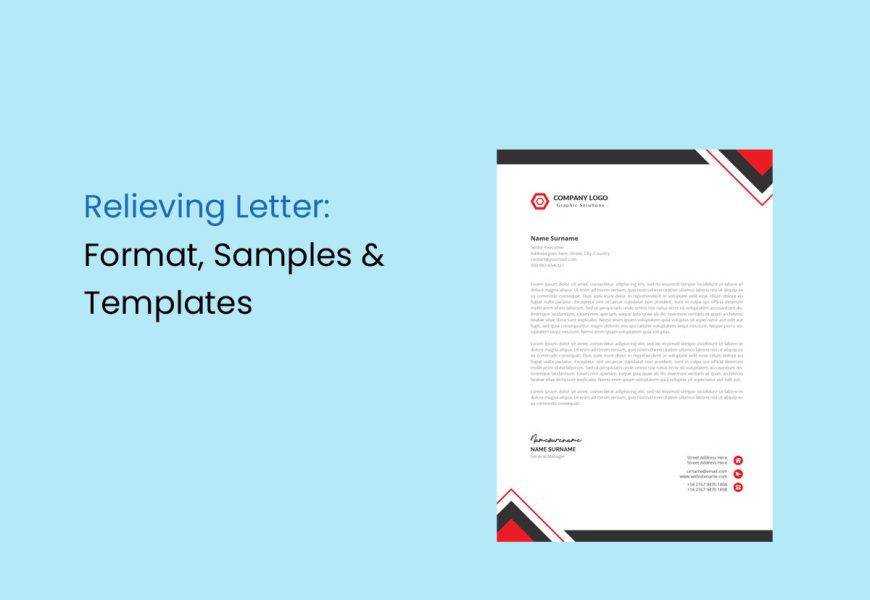A relieving letter serves as a crucial document when transitioning between jobs, encapsulating vital details about one’s prior employment. It stands as concrete proof that an employee has fulfilled their duties and obligations in their previous organisation.
In this article, we’ll acquaint ourselves with the format of a relieving letter, its significance, and what it entails. Additionally, we’ll explore a selection of templates and free samples conveniently accessible in MS Word files.
How to Write a Relieving Letter
While composing a relieving letter for employees, HR professionals must adhere to specific guidelines, as outlined in our relieving letter samples. Here are the key considerations to keep in mind:
- The relieving letter should be crafted on the official company letterhead.
- It must specify the employee’s final job position within the organisation.
- The letter should pertain to the employee’s submitted resignation letter.
- Essential details such as the date of issuance must be clearly stated.
- The letter should be succinct, precise, transparent, and courteous. Accuracy in all mentioned details is imperative.
Relieving Letter Format
Relieving letters need to be concise and professional in their tone. Hence, it is imperative that you include all the important details that need to be there and draft a sample accordingly.
Details Required in a Relieving Letter
Like all things written, relieving letters are pretty subject and don’t really follow a specific format. However, the details remain mostly the same among all organisations. It is important to note for the employers drafting such documents that the company’s name and logo go with it. The document will represent and reflect your company’s values. So, one needs to be mindful of that. Here’s a basic checklist of things that need to be there;
Company Information
The credibility of your company can be enhanced by ensuring that the relieving letter includes the professional identity of the company.
Date
The first segment of the relieving letter format includes the issuance date, placed on the top left side of the page. This detail is crucial as it serves as evidence in case of any disputes or issues.
Employee Information
An ideal relieving letter format must encompass employee details. Following the issuance date, the employee’s name, designation, and department are specified alongside the company’s name.
Subject Line
Typically, companies simply state ‘Relieving Letter’ as the subject, providing a concise overview of the letter’s purpose.
Salutation
In this section, the recipient is addressed by their first name with a formal salutation, such as “Dear.” For instance, ‘Dear Ashley.’
Body of the Letter
This section outlines the employee’s resignation particulars, confirming the acceptance of the resignation and indicating the date when the employee initiated the resignation and their final day of employment.
Formalities and Appreciation
Here, the employer assures the employee of receiving a full and final settlement after a specified period, depending on the company’s policies.
Signature
The relieving letter format concludes with the sender’s signature. At the bottom left corner of the page, the sender signs off with their name, designation, department, and company name.
Relieving Letter Format Template
Here’s one template that will also give you the format of the relieving letter.
[Company Address]
[City, State, ZIP Code]
[Phone Number]
[Email Address]
[Date]
[Employee’s Name]
[Employee’s Designation]
[Employee’s Address]
Subject
Salutations
(Content)
Sincerely,
[Your Name]
[Your Designation]
[Your Contact Information]
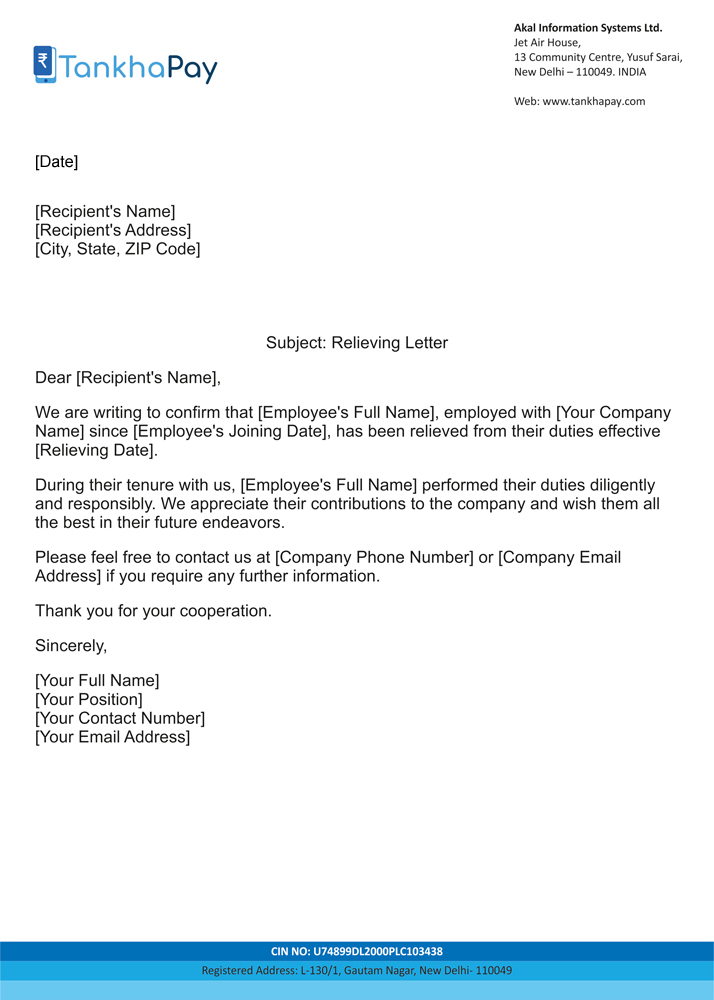
Download Relieving Letter in Different Format
| Formats | Files |
|---|---|
Relieving Letter Word Format Download |
Download |
Relieving Letter Format PDF |
Download |
Different Relieving Letter Templates
Below, we have curated a few situations that may arise and the subsequent relieving letter templates.
Template 1. Relieving Letter for Teachers
[School Name]
[School Address]
[City, State, ZIP Code]
[School Phone Number]
[School Email Address]
[Date]
[Employee’s Name]
[Employee’s Designation]
[Employee’s Address]
This is to certify that [Teacher’s Full Name], with Employee ID [Employee ID], has been relieved from their duties as a Teacher at [School Name] effective from [Last Working Date].
During [Teacher’s Full Name]’s tenure with us, they exhibited exceptional dedication, passion, and teaching skills. Their commitment to fostering a positive learning environment and nurturing our students’ growth has been commendable. [Teacher’s Full Name] has contributed significantly to the academic and personal development of our students, and their efforts are highly appreciated.
We express our gratitude for [Teacher’s Full Name]’s valuable contributions to our school community and wish them every success in their future teaching endeavours. We are confident that they will continue to inspire and educate students wherever they go.
Warm regards,
[Principal’s Full Name]
[Principal’s Designation]
[Principal’s Contact Information]
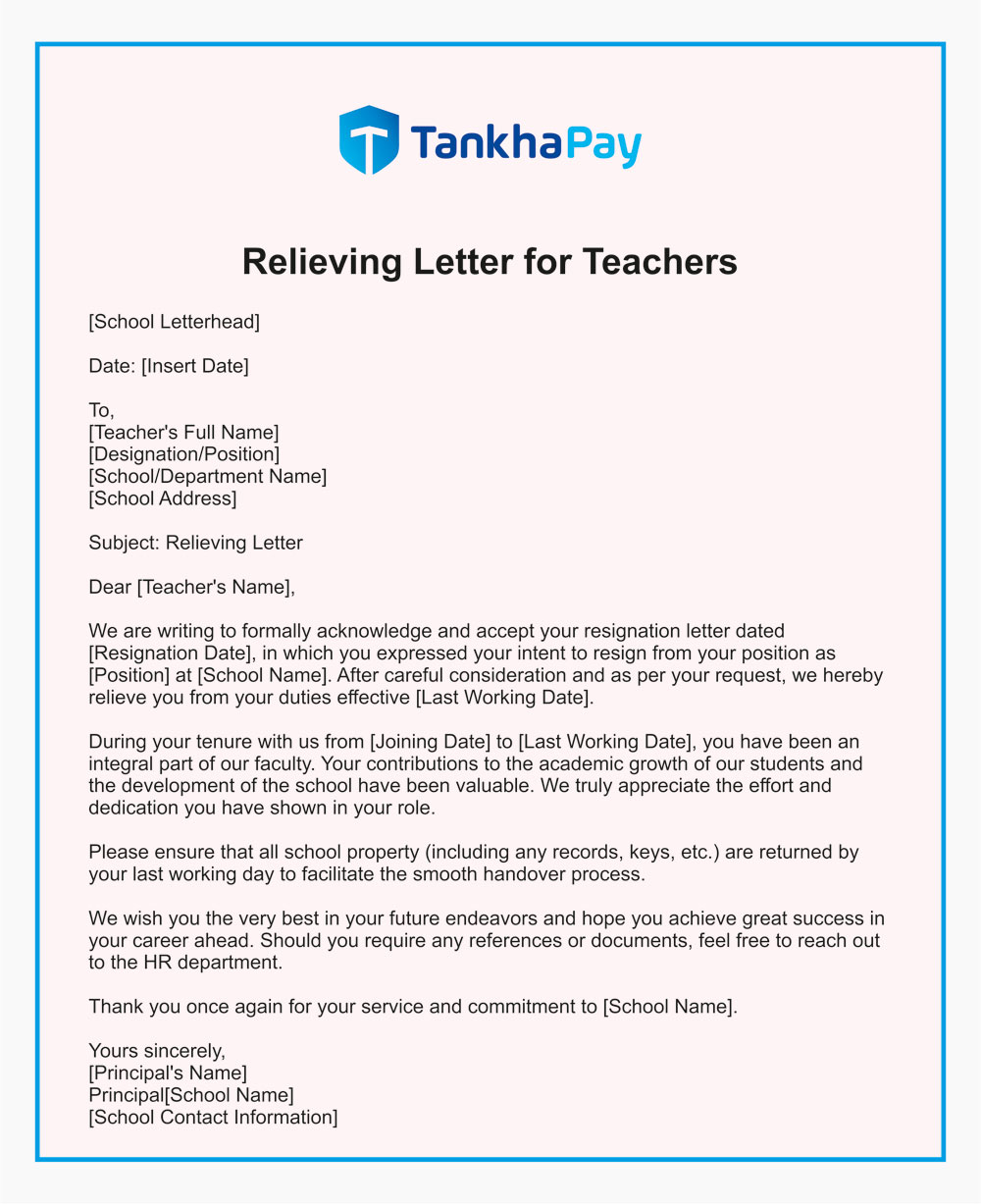
Template 2. Relieving Letter Digital Marketing Executive
[Company Address]
[City, State, ZIP Code]
[Phone Number]
[Email Address]
[Date]
[Employee’s Name]
[Employee’s Designation]
[Employee’s Address]
This is to certify that [Employee’s Full Name], with Employee ID [Employee ID], has been relieved from their duties as a Digital Marketing Executive at [Company Name] effective from [Last Working Date].
During [Employee’s Full Name]’s tenure with us, they demonstrated exceptional skills and dedication in the field of digital marketing. Their creativity and strategic approach significantly contributed to our online presence and marketing campaigns. We appreciate their hard work and innovative ideas.
We would like to express our appreciation for their contributions during their tenure with us. We wish them the best in your future endeavours. Please be informed that the full and final settlement, including any pending dues, will be processed as per the company’s policies.
If required, our HR department can be reached at [HR Contact Number] or [HR Email Address] for any further assistance regarding your employment-related matters.
Yours sincerely,
[Your Name]
[Your Position]
[Your Contact Number]
Template 3. Relieving Letter for an SEO Executive
[Company Address]
[City, State, ZIP Code]
[Phone Number]
[Email Address]
[Date]
[Employee’s Name]
[Employee’s Designation]
[Employee’s Address]
This is to certify that [Employee’s Full Name], with Employee ID [Employee ID], has been relieved from their duties as an SEO Executive at [Company Name] effective from [Last Working Date].
During [Employee’s Full Name]’s tenure with us, they displayed exceptional skills and expertise in search engine optimization. Their strategic approach and dedication significantly enhanced our online visibility and contributed to the success of our digital marketing efforts. We commend their valuable contributions and commitment to achieving our marketing goals.
We extend our best wishes to [Employee’s Full Name] for their future endeavours, and we have no doubt that they will excel in their career.
Warm regards,
[Your Full Name]
[Your Designation]
[Your Contact Information]
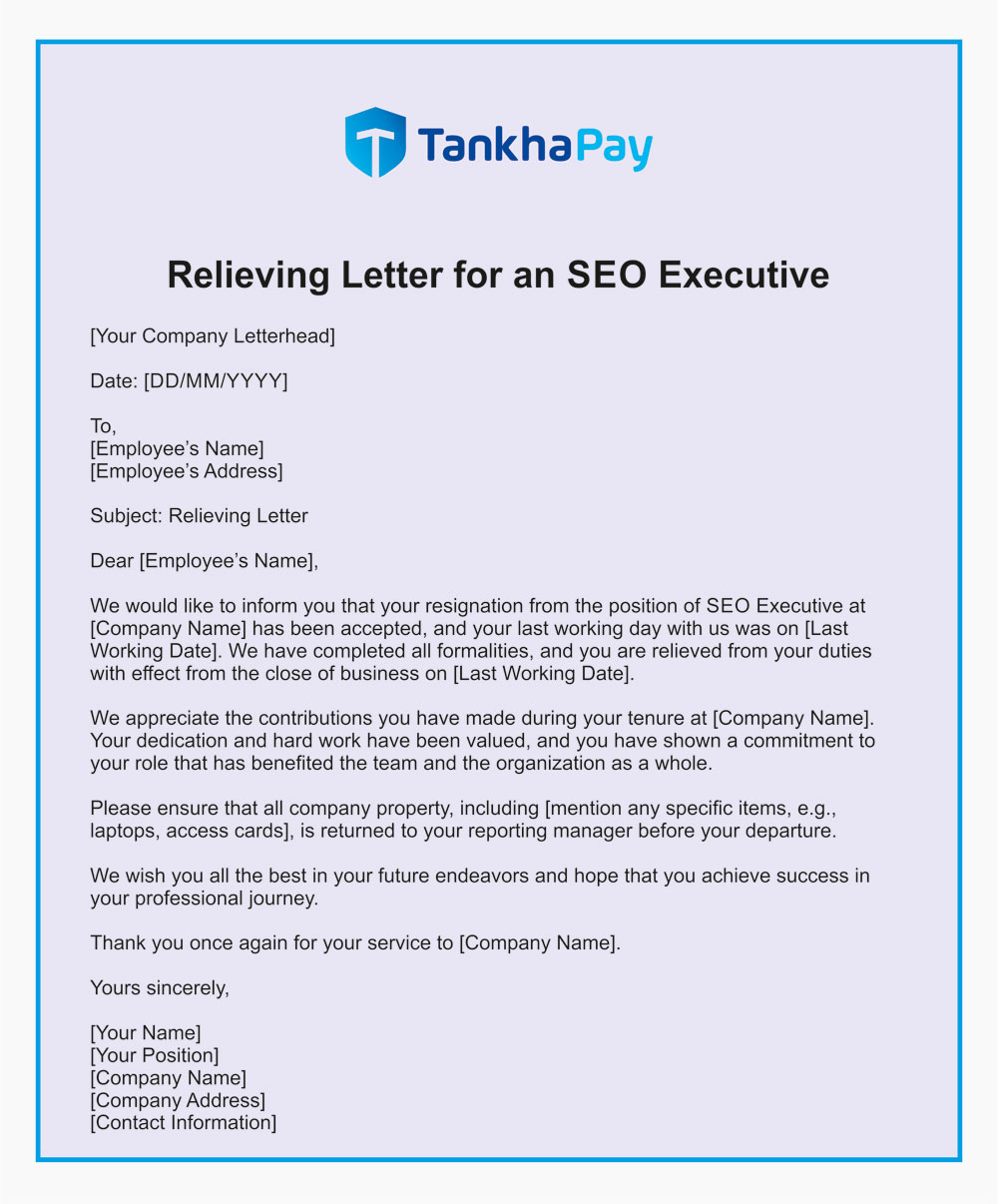
Template 4. Relieving Letter for Accountant
[Company Address]
[City, State, ZIP Code]
[Phone Number]
[Email Address]
[Date]
[Employee’s Name]
[Employee’s Designation]
[Employee’s Address]
During their time here, [employee’s name] demonstrated meticulous attention to financial details, accuracy, and dedication to maintaining the company’s financial records. We appreciate their contributions and wish them all the best in their future endeavours.
Sincerely,
[Your Name]
[Your Position]
[Your Contact Number]
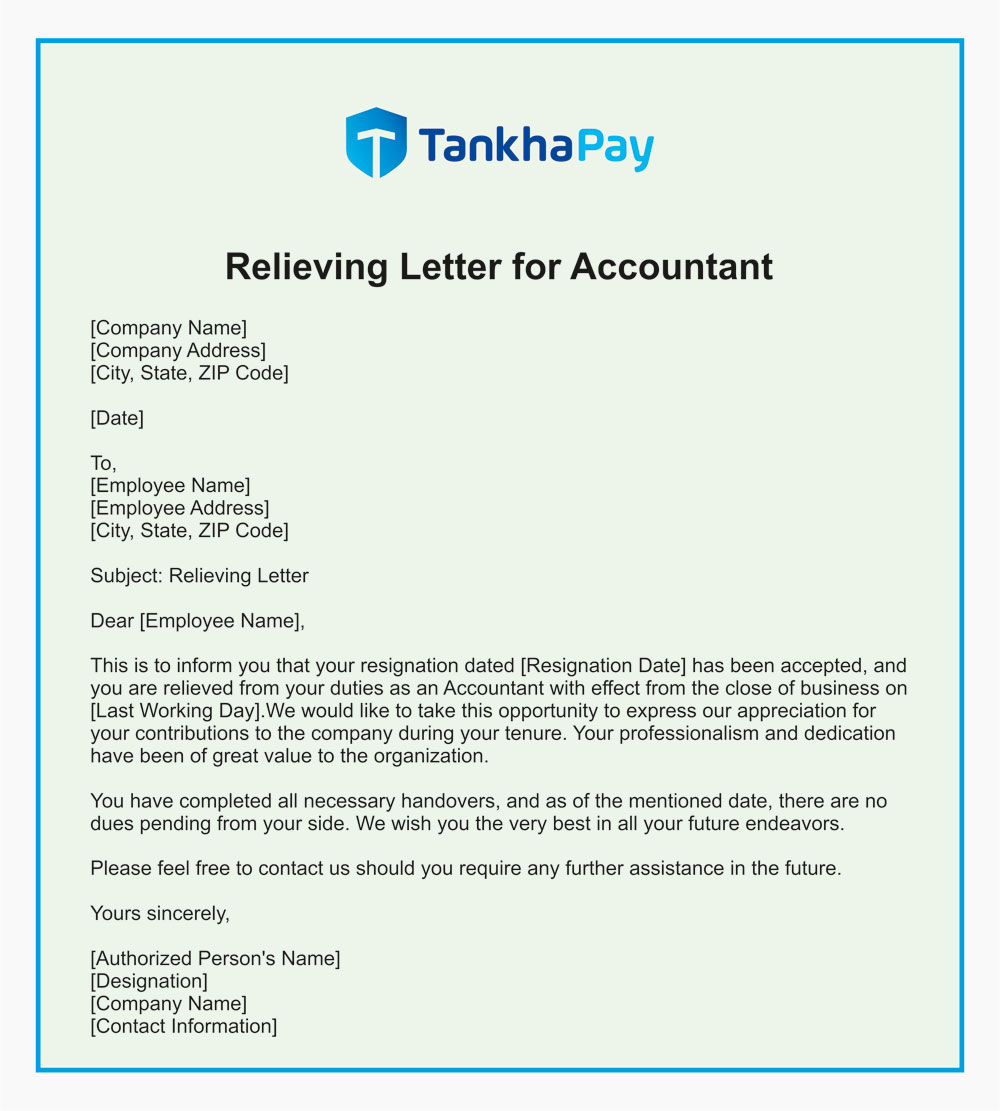
Template 5. Relieving Letter for a Manager
[Company Address]
[City, State, ZIP Code]
[Phone Number]
[Email Address]
[Date]
[Employee’s Name]
[Employee’s Designation]
[Employee’s Address]
We confirm that [Employee’s Full Name], Employee ID [Employee ID], has been officially relieved of their responsibilities as a Manager at [Company Name], effective from [Last Working Date].
During [Employee’s Full Name]’s tenure, their exceptional leadership, dedication, and managerial expertise significantly impacted our projects and overall company objectives. Their ability to inspire and guide the team, coupled with their strategic vision, contributed immensely to our success. We deeply appreciate their hard work and positive influence on our organization.
We extend our best wishes to [Employee’s Full Name] in their future undertakings. We are confident that their skills and dedication will continue to drive success, and we believe they will excel in any professional pursuit they undertake.
Warm regards,
[HR Manager’s Full Name]
[HR Manager’s Designation]
[HR Manager’s Contact Information]
Request for Relieving Letter From Employee
Dear Sir/Madam,
I am [your name] and have recently resigned from the position [your designation].
I kindly request you issue my relieving letter, final settlement, and the certificates I provided during my tenure with the company.
I submitted my resignation letter on [resignation date]. Having duly served my notice period and completed all required formalities, I would greatly appreciate your prompt issuance of my relieving letter. This is crucial as I need to submit it, along with other documents, to my new company when I commence my new role on [new joining date].
Warm regards,
[Employee’s Name]
[Employee’s Designation]
[Employee’s Contact No.]
Common Mistakes to Avoid While Writing Relieving Letter
- Lack of Clarity: Relieving letters should clearly state the employee’s last working day, any outstanding dues, and other relevant details. Ambiguity can lead to confusion and legal complications.
- Delayed Issuance: Relieving letters should ideally be provided on the last working day or shortly thereafter. Delays can inconvenience employees when they join new jobs and might reflect poorly on the organisation’s professionalism.
- Incomplete Information: Failing to include essential details such as the employee’s designation, duration of employment, and reason for leaving can render the relieving letter incomplete and insufficient for future employers.
- Absence of Signatures: Authorised personnel within the organisation should sign a relieving letter. Unsigned letters lack authenticity and can be questioned by future employers.
- Typos and Errors: Spelling mistakes, grammatical errors, or inaccuracies in dates and other details can create a negative impression and diminish the professionalism of the document.
- Inconsistencies: Relieving letters should align with the terms mentioned in the employment contract. Any disparities between the two documents can lead to disputes and legal challenges.
- Negative or Ambiguous Language: The tone of the letter should be positive and professional. Negative language or vague statements can lead to misunderstandings and potential legal issues.
- Non-Compliance with Company Policies: If the organisation has specific formats or guidelines for relieving letters, not adhering to these can lead to discrepancies and cause confusion.
- Lack of HR Involvement: Relieving letters should ideally be issued by the HR department or an authorised representative to ensure consistency and adherence to company policies.
- Failure to Mention Enclosures: If there are any additional documents enclosed with the relieving letter (such as experience certificates), failing to mention them can create confusion regarding the completeness of the documentation.
Legal and Compliance Considerations
While not mandated by law, a relieving letter holds significance in the employer-employee dynamic. It is advisable for a company to establish a clear and well-defined procedure for generating relieving letters, including specific terms. These guidelines should be communicated to the employee upon their hiring, ensuring clarity and preventing misunderstandings during their departure or termination.
When an employee decides to leave an organisation, adhering to the notice period is crucial to comply with legal requirements, specifically concerning the issuance of a relieving letter. Failure to observe this notice period can result in various legal consequences:
- Violation of Employment Contract: The employment contract typically outlines the mandatory notice period. Disregarding this period can be considered a breach of contract, enabling the employer to pursue legal action against the departing employee.
- Delayed or Withheld Relieving Letter: The relieving letter, a formal document confirming the employee’s departure, may be delayed or withheld if the notice period is not served. This document is vital for legal compliance and future employment opportunities.
- Financial Penalties: Breaching the notice period might lead to financial penalties as stipulated in the employment contract. These penalties could involve forfeiting certain benefits or paying compensation to the employer.
- Legal Implications and Damages: Employers can take legal action against the employee for non-compliance. Legal proceedings can result in the employee being liable for legal fees and damages if the court rules in favour of the employer.
- Impact on Career: Leaving without fulfilling the notice period can damage the employee’s professional reputation and hinder future job prospects, especially in roles where adherence to legal and contractual obligations is critical.
- Challenges in Joining New Organizations: Without a proper relieving letter, joining a new organisation becomes problematic as proof of previous employment and departure terms is unavailable, leading to potential legal and professional complications.
- Emotional and Psychological Stress: Apart from the legal ramifications, there’s the emotional burden of strained relationships with former colleagues, anxiety about legal repercussions, and uncertainties regarding future employment prospects.
In light of legal compliances related to relieving letters, employees should prioritise open communication with HR and management. It is essential to fulfil the notice period to ensure legal obligations are met, safeguarding one’s professional standing and avoiding potential legal consequences.
Explore More Sample Letters
FAQs about Relieving Letter
Is a terminated employee eligible for a relieving letter?
Yes, a terminated employee is eligible for a relieving letter from any company where they worked for more than six months. However, it does mention the reason for their termination.
Is issuing relieving letters a legal obligation/compulsory?
No, it is not compulsory nor a legal obligation. It helps HR keep the records for future reference.
Can employers deny relieving letters?
In cases where the employee has absconded, or the service provided by the employee is not up to mark, or the employee only stayed with the company for less than 6 months, employers refuse to issue relieving letters for them. Suppose you have followed all protocols, completed all formalities, and still haven’t received your relieving letter. In that case, you can nudge the concerned person to send it to you as soon as possible via email, call, or face-to-face interaction.
What is the difference between a relieving letter and an experience letter?
An experience letter, on the other hand, is a document that contains the history of the employee’s service, such as the designation given to him when he/she leaves his/her organisation.
A relieving letter contains information that says the employer has accepted the employee’s decision to resign from the organisation along with his/her last working day.
A relieving letter contains information that says the employer has accepted the employee’s decision to resign from the organisation along with his/her last working day. An experience letter, on the other hand, is a document that contains the history of the employee’s service, such as designation.

